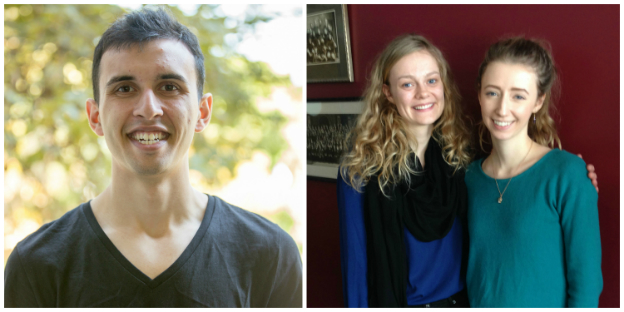Renaissance Award winners to study Japanese longevity, 100-mile diet

Fourth year Biology and Psychology student Nabil Khaja and fourth year Arts and Science students Rachel Brain and Maia Stevenson are the recipients of the 2015 Renaissance award
What does it take to live to the age of 100?
That’s the question Nabil Khaja hopes to answer when he travels to Japan this summer to study the people of Okinawa.
The island’s population is known as one of the longest-lived in the world, with more centenarians (people 100 years of age or older) than anywhere else on the planet.
The fourth-year biology and psychology student was inspired to study the Okinawa’s longevity by his own personal experience with health.
“Over the course of my undergrad career, I noticed my health deteriorating both mentally and physically because I wasn’t eating or exercising properly,” he says. “There was a lot of stress and it sometimes became overwhelming.”
Khaja found out about the Okinawa while researching how to better deal with stress. He plans to study the group’s diet, physical activity and social and spiritual rituals to better understand the secret to their longevity.
“But it’s not about how long I live or to what age – it’s about how my life is spent and the quality of it,” he says.
Khaja is one of three students to receive this year’s Drs. Jolie Ringash and Glen Bandiera Renaissance Award, which gives students up to $25,000 to pursue interests outside of their area of study.
The alumni-funded award provides students with the opportunity to take time away from their normal studies to explore outside interests while conducting their own learning.
“The award gets you to think about something outside your main area of focus,” says Khaja. “Sometimes people are too afraid to think outside their discipline because they’re so focused on getting really good at one particular thing. With a project like this, you start to discover other things that you’re interested in, or other ways you want to improve yourself.”
Arts & Science students Rachel Brain and Maia Stevenson will use their award to travel to farms in Squamish, BC, Cathlamet, Washington and Klamath, California, where they will work and learn about sustainable, organic food supply chains.
At the end of the summer, Brain and Stevenson will take their newly-acquired knowledge of farming production to Sault Ste. Marie, Ontario, where they will continue learning about sustainable farming and share their knowledge with the local population.
They’ll also live on a diet of food that comes from within a 100-mile radius of the city.
“In some ways it’s an experiment to really see if it is possible to eat well locally in northern Ontario,” says Brain.
The diet of locally-sourced food means no coffee, dairy, grains, spices, or anything else that has to be transported into the area.
“Once you start considering all the ingredients you need for meals it becomes challenging to find these items locally,” says Brain.
“We enjoy buying good food, but we don’t want to be passive consumers of food for the rest of our lives,” says Stevenson. “We’re hoping that by having this summer to actually engage directly with the organic farmers we buy food from, we will come away with a better understanding of how important local and organic food is,” says Stevenson.
Jolie Ringash and Glen Bandiera talk about the Renaissance Award below:

